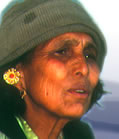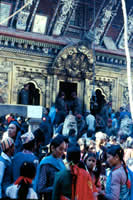 |
 |
||
 |
|||
|
RELATED THEMES economics family life identity spiritual beliefs OTHER LOCAL THEMES BACKGROUND |
festivals
The possibilities of preserving cultural traditions - and also exploiting their commercial potential - through the medium of film are raised in one interview. One older narrator (Nepal 3) says that songs are dying out as the younger generation is interested only in modern education, not tradition: "We old ones are left to sing. If we old people all die one by one than this bhajan (devotional song) and churdka (folk song) will also become extinct from our culture." Another threat to festivals and cultural activities identified in the new interviews (Nepal 24-32) is the fear and anxiety engendered by the conflict between Maoists and government; people fear to travel around and take part in festivals: "There were quite a few jatras (pilgrimages, fairs or religious festivals). We could comfortably witness these all night. Now since the Maoists it is not the same. there are restrictions, because of the fear of Maoists. [jatras] have become fewer. [This year] I could not go to make offerings for my mother and father. I was afraid" (Nepal 29). quotes about festivals"It is more difficult for the person who's alive to survive. Those who are dead - it doesn't matter to them. But for those who survive and have to perform these ceremonies it is a real trouble. They think if they observe Ghewa (funeral rites) it will reach the dead person who will benefit from it. But I don't think like this. Because of so much money being spent even the living person will die. I don't get any benefit from it." ".there is no possibility to accumulate by dancing and singing. No knowledge could be gained, only merriment. There is more expense in the festivals. Chettri and Bahun also celebrate general festivals but Magar celebrate by cutting a beast and preparing other dishes, so they spend more." "Men and the women have different works. The men buy goats, paint houses, buy clothes and other things necessary to celebrate the festivals. The women have to wash clothes, make the house nice and clean, cook and provide rice, beaten rice, etc. The women have more work to do. the men don't help, they just bring the materials. During the festivals, it's the women who cook the food, feed the children, wash the dishes, look after the animals and many other things, so it looks like the women always have more work." "I love [my village]. You cannot help loving a place where you lived and grew up. I remember it a lot during Dashain (major Nepali festival) and Tihar (festival of lights, also known as Diwali). If I don't get to go during Dashain, Tihar, I feel like crying.
[When it is] festival time of the Tamangs and we have to perform religious ceremony and light lamps to Buddha, and when we ask for money for such purpose [the factory owner] will not give us any. [So we] borrowed from here and there and lit lamps." |
|
 Festivals are clearly a high point of most people's lives, although many complain of the expense involved; several say they are simply too lavish and costly now and lead many people into debt. Magars are said to spend more on the celebrations than Chettri and Bahun. One Tamang narrator singles out Tamang expenditure on Ghewa (funeral rites) as a source of impoverishment. Another narrator, who has migrated to Kathmandu for work, says it is at festival time when she longs most keenly to visit her home in the hills, and resents the poverty that makes this impossible. Festivals mentioned include Chhewar, Bratabandha, Dashain, Tihar, Maghe Sankranti, Swane Sankranti, Saradde, Ghewa, Sawanay (Magar festival), Teej (women only), Awashi, Baishaki Purnima, Dethiya, Lohsar (Buddhist). One narrator mentions some variations in the way that different castes perform ceremonies.
Festivals are clearly a high point of most people's lives, although many complain of the expense involved; several say they are simply too lavish and costly now and lead many people into debt. Magars are said to spend more on the celebrations than Chettri and Bahun. One Tamang narrator singles out Tamang expenditure on Ghewa (funeral rites) as a source of impoverishment. Another narrator, who has migrated to Kathmandu for work, says it is at festival time when she longs most keenly to visit her home in the hills, and resents the poverty that makes this impossible. Festivals mentioned include Chhewar, Bratabandha, Dashain, Tihar, Maghe Sankranti, Swane Sankranti, Saradde, Ghewa, Sawanay (Magar festival), Teej (women only), Awashi, Baishaki Purnima, Dethiya, Lohsar (Buddhist). One narrator mentions some variations in the way that different castes perform ceremonies.